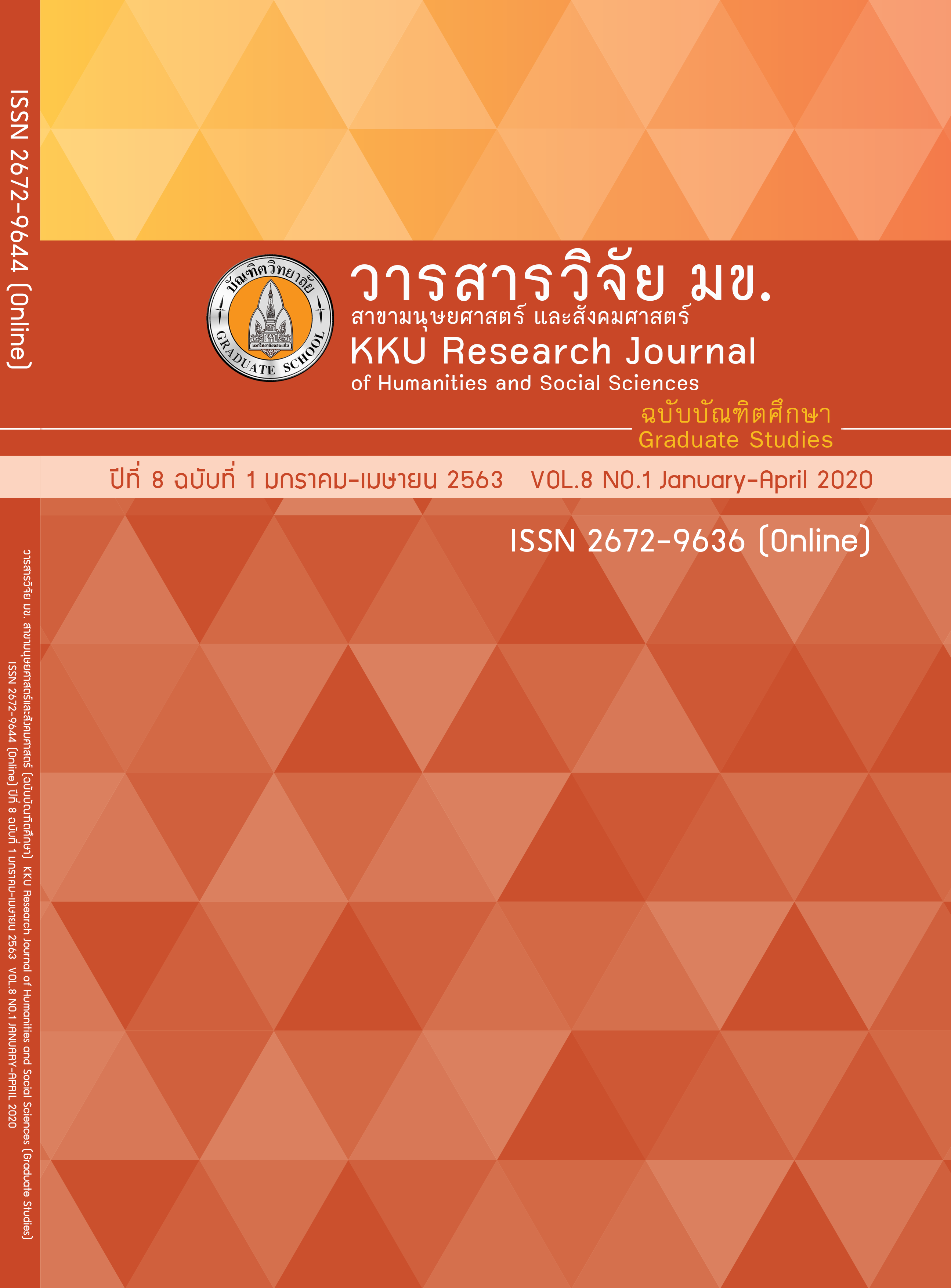Policy Recommendation to Develop Innovative Organization of Secondary School in Khon Kaen Province
Keywords:
Policy proposals, Innovative organization, Secondary schoolsAbstract
This research is a policy research that aims to create a policy proposals to develop an innovative organization of secondary schools in Khon Kaen province. There are 2 stages of research conducted by phase 1, which is a study to create a policy to develop an innovative organization of secondary schools in Khon Kaen province by studying multi-case studies and 3 experts in-depth interviews. These result was the draft of the proposals for the development of innovative organizations. Phase 2 to examine the proposals for the development of innovative organizations of secondary schools in Khon Kaen province considered by experts which consists of 3 executives and scholars to evaluate the propriety, feasibility and utility of policy proposals. The results of the research revealed that the policy proposals for the development of innovative organization of secondary schools in Khon Kaen province in terms of vision, mission, goals, objectives, strategies of the development framework of innovative organization of secondary schools has the propriety,feasibility and utility at the highest level.
References
New Alternative to Educational Administration. Nursing Army Officer
Journal. 2014; 15(1): 45-51.
2. Yotingyong K. Innovative Organization Concepts and Processes.
Bangkok: Chulalongkorn University; 2009.
3. Thongwan K. Relationship of Factors that Contribute to
Learning Organization and Innovative Organization Level :Case Study
of the National Science and Technology Development Agency.
Journal of Business Administration. 2010; 33(128): 34-48.
4. Sutthawat W, Siriwong P. Being the Innovator of Basic
Education in the Public Sector: the Study of Grounded
Theory. Veridian E-Journal. 2015; 8(2): 281-300.
5. Gunduz Y, Balyer A. Examining innovation needs of
primary schools: Teachers’ perceptions. Procedia social
and behavioral sciences. 2014; 116: 139-143.
6. Haelermans C, De Witte K. The role of innovations
in secondary school performance: Evidence from a conditional
efficiency model. European Journal of Operation Research.
2011; 223(2): 541-549.
7. Sinlarat P. CCPR model New Paradigm of Creative
leadership and Image production. Bangkok, Chulalongkorn
University publisher; 2016.
8. Ministry of Digital Economy and Society and Thailand
Technology industry and information association. Innovative
school under Changing Education Paradigm for 21st century,
Bangkok: Office of employment secretary; 2017.
9. Rotrak I. Relationship between innovative organization
and innovative creation competency : a case study of office of
the civil service commission [MSc thesis]. Bangkok.
Chulalongkorn University; 2011.
10. Morakul R, Chanasid D, Booncherdchoo N, Toujinda O.
Analysis of Innovative organization elements in basic education
institutions. Veridian E-Journal. 2017; 10(2): 2341-2355.
11. Saki S, Shakiba H, Savari M. Relationship the Organization
and Organizational Innovation at University of Tehran.
Journal of Organization Leadership and Leadership. 2013;
11(1): 1-18.
12. Ganter A, Hecker A. Configurational paths to organizational
innovation: Qualitative comparative analyses of antecedents and
contingencies. Journal of Business Research. 2014; 67(6): 1285-1292.
13. Saratana W. School director : Three dimensional of profession
development to effective administrator. Bangkok: Aksarapapat; 2004.
14. Oaks M M. Policy research for educational leader. A concept
paper for a two-week intensive workshop for student in doctoral program
in educational administration. Khon Kaen: Khon Kaen University; 2003.
15. Tashakkori A, Teddli C. Mixed methodology: Combining qualitative
and quantitative approaches. California: SAGE Publication, Inc; 1998.
16. Pharangkun C. The Study of the Innovative Organization of Basic
Schools Under the Office of the Commission Basic Education in Ratchaburi
Province. Faculty of Education, Chom Bueng Rajabhat University; 2013.
17. Sirito S, Latemsun R, Kittipongkosol W. The Study of the innovative
organization of Higher Education Institutions in Thailand. Mahanakorn
Business Administration Technology Journal. 2017;14(1): 159-177.
18. Chumwangwapee A, Ngamkanok S, Panhun S. The Development
of the innovative organization model of the Secondary Schools under
the Office of the Basic Education Commission. Journal of Education
Mahasarakarm university. 2018; 12(3): 207-219.
19. Maneenop W, Somprach K, Thawinkarn D. Model of School
development towards Innovative school under The office of Basic
Educational Commission, Dissertation, Graduate school.
Khon Kaen: Khon Kaen University; 2019.




